7a unit4语法
牛津译林版英语7A Unit4 My day知识点归纳
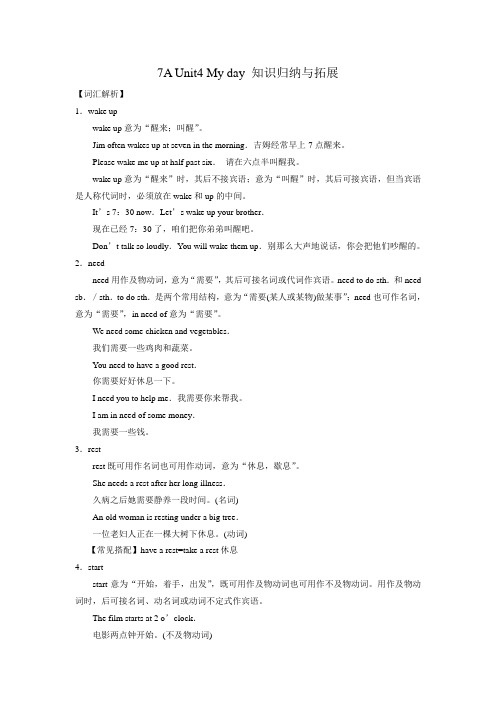
7A Unit4 My day 知识归纳与拓展【词汇解析】1.wake upwake up意为“醒来;叫醒”。
Jim often wakes up at seven in the morning.吉姆经常早上7点醒来。
Please wake me up at half past six.请在六点半叫醒我。
wake up意为“醒来”时,其后不接宾语;意为“叫醒”时,其后可接宾语,但当宾语是人称代词时,必须放在wake和up的中间。
It’s 7:30 now.Let’s wake up your brother.现在已经7:30了,咱们把你弟弟叫醒吧。
Don’t talk so loudly.You will wake them up.别那么大声地说话,你会把他们吵醒的。
2.needneed用作及物动词,意为“需要”,其后可接名词或代词作宾语。
need to do sth.和need sb./sth.to do sth.是两个常用结构,意为“需要(某人或某物)做某事”;need也可作名词,意为“需要”,in need of意为“需要”。
We need some chicken and vegetables.我们需要一些鸡肉和蔬菜。
You need to have a good rest.你需要好好休息一下。
I need you to help me.我需要你来帮我。
I am in need of some money.我需要一些钱。
3.restrest既可用作名词也可用作动词,意为“休息,歇息”。
She needs a rest after her long illness.久病之后她需要静养一段时间。
(名词)An old woman is resting under a big tree.一位老妇人正在一棵大树下休息。
(动词)【常见搭配】have a rest=take a rest休息4.startstart意为“开始,着手,出发”,既可用作及物动词也可用作不及物动词。
牛津译林版英语7AUnit4Grammar教学设计
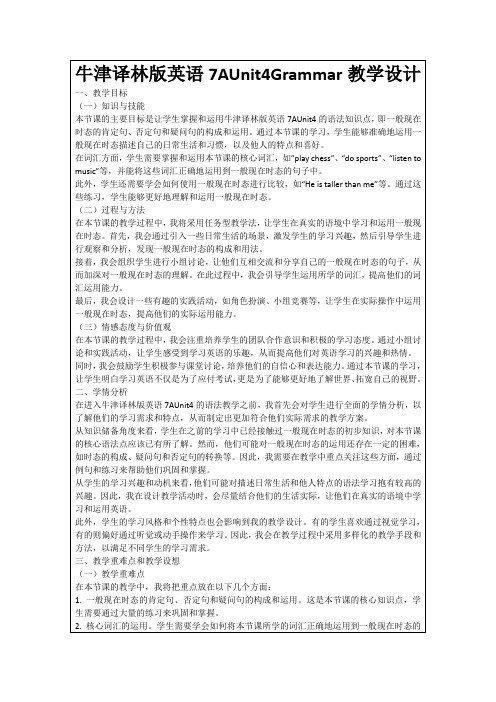
为了有效地突破上述重难点,我设想采取以下教学策略:
1.情境导入:通过展示一些日常生活的图片和场景,让学生初步感知一般现在时态的运用,激发他们的学习兴趣。
2.自主学习:让学生自主探究一般现在时态的构成和用法,鼓励他们提出问题和解决问题。
3.合作学习:组织学生进行小组讨论,让他们互相交流自己的一般现在时态句子,从而加深对一般现在时态的理解。
(二)过程与方法
在本节课的教学过程中,我将采用任务型教学法,让学生在真实的语境中学习和运用一般现在时态。首先,我会通过引入一些日常生活的场景,激发学生的学习兴趣,然后引导学生进行观察和分析,发现一般现在时态的构成和用法。
接着,我会组织学生进行小组讨论,让他们互相交流和分享自己的一般现在时态的句子,从而加深对一般现在时态的理解。在此过程中,我会引导学生运用所学的词汇,提高他们的词汇运用能力。
四、教学内容与过程
(一)导入新课
在导入新课时,我会利用多媒体展示一些与学生日常生活相关的图片和场景,如他们的兴趣爱好、生活习惯等。通过这些图片和场景,让学生初步感知一般现在时态的运用,激发他们的学习兴趣。
接着,我会用提问的方式引导学生思考一般现在时态的概念和用法。例如:“你们平时是怎么描述自己的日常生活的?是如何描述他人的特点和喜好的?”等问题。通过这些问题,让学生对一般现在时态有一个初步的了解。
其次,我会布置一些翻译练习,让学生将中文句子翻译为英文,并使用一般现在时态。这样的练习能够帮助学生将所学的语法知识与实际语言运用相结合,提高他们的语言表达能力。
此外,我还会布置一些小组作业,让学生合作完成。例如,让他们共同编写一个小对话,其中一个角色需要使用一般现在时态来描述自己的日常生活和习惯,另一个角色则需要用一般现在时态来提问和进行比较。
牛津译林版7A Unit4 My day Grammar课件(共23张PPT)
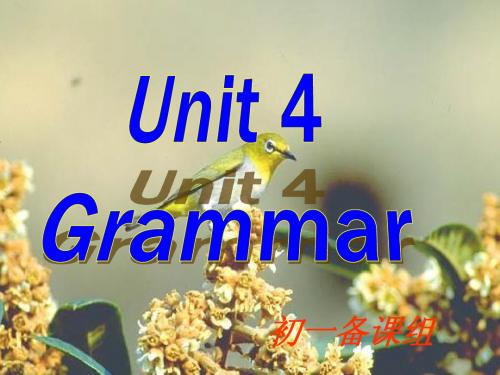
5在儿童节
6在六岁(2)
at six(years old), at the age of six 7给---写回信 write back to
would like sth, 9在秋天 in autumn 10玩得很高心have great fun
13. It is a good idea to go for a walk ____ a sunny morning.
on
15. The story happened _____ on a cold winter morning. 16. We’ll have a party ____ next week.
在早饭时
at breakfast
在13岁的时候
at 16(years old)/ at the age of 16
Tommy’s school life
in on in at on in on
Fill in the blanks with in, on or at where necessary. on Sunday. 1. We don’t go to school_______
8想要某物
11有许多时间做某事
have much time to do sth
12舞蹈课 13.去溜旱冰
dancing lessons go roller skating
学海拾贝
A. Prepositions of time
in: we use ‘in’ before _______________, parts of the day _______,seasons _______, ______. months years on: we use ‘on’ before:_____, days ______ dates at: we use ‘at’ before: _________, times of day
上海英语 7A U4知识梳理

Unit 41.draw(三态) draw – drew – drawn2.邻居n. neighbour 小区n. neighbourhood3.build (三态) build-built-built 建筑工人n. builder4.搬v. move (n.) removal 在搬家那天on a removal day5.秘密n. secret 秘书n. secretary pl. secretaries6.建造v. construct n. construction7.good (adj.) / well (adv.) (比较级、最高级)– better – bestlittle -less-least8.和......一样the same … as 和......一样大the same age as = as old as9.一件家具 a piece of furniture (un.)10.在一家医院里工作work in a hospital 为一家搬家公司工作work for a removal companywork (un.) 一份工作a piece of work = a job11.使病人好转make sick people better使某人做某事make sb do sth一位病人a sick person = a patient 生病be/get sick/ill12.打信type letters 打字员n. typist scientist art ist13.wear(三态)wear– wore – worn 他正穿着一件红色大衣He is wearing a red coat.把那件红色大衣穿上。
Put on the red coat.14.drive(三态) drive – drove – driven15.快速(adj.) quick – (adv.) quickly (adj.) fast – (adv.) fast16.营救rescue = save从危险中拯救人们rescue/ save people from danger = keep people safe from danger17.投递/传送v. deliver n. delivery delivery truck 送信件和包裹deliver letters and parcels to sb18.一件制服a uniform19.一辆救护车an ambulance20.在上班be at work21.meet(三态) meet-met–met22.管理v. manage n. management 成功做某事manage to do sth 经理n. work as a manager23.接电话answer the phone24.参加会议go to meetings = attend meetings25.自行车(V. / n.) cycle 摩托车n. motorcycle 骑摩托车的人n. motorcycliste(三态) come-came– come27.向, 朝prep. towards = to28.catch (三态) catch-caught – caught29.run (三态) run – ran– run30.立刻的(adj.) immediate--- (adv.)immediat e ly = at once =right away31.break(三态) break – broke – broken 骨折的腿a broken leg32.carry(三态) carry – carried – carried33.发动机n. engine 工程师n. engineer34.撞到某人knock sb. down35.受伤be/get hurt 昨晚我的眼睛很痛My eyes hurt last night.36.让某人不要做某事let sb not do sth37.两天后two days late r38.empty v. 倒空(三态)empty-emptied-emptied(三单) empties39.烘烤v. bake 面包店– bakery 面包师– baker40.sell(三态) sell – sold – sold 把某物卖给某人sell sth. to sb.n. sale41.buy (三态)buy-bought – bought 为某人买某物buy sth. for sb.= buy sb. sth.42.在某人去某地的路上on one’s way to sp.在某人回家的路上on one’s way home43.sweep (三态) sweep-swept-swept44.收集v.collect n. collection 收藏家n. collector。
牛津译林版英语7A Unit4 My day 知识归纳与拓展
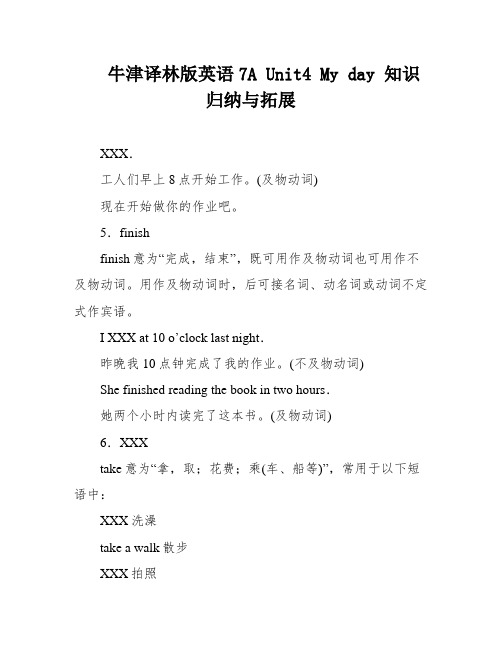
牛津译林版英语7A Unit4 My day 知识归纳与拓展XXX.工人们早上8点开始工作。
(及物动词)现在开始做你的作业吧。
5.finishfinish意为“完成,结束”,既可用作及物动词也可用作不及物动词。
用作及物动词时,后可接名词、动名词或动词不定式作宾语。
I XXX at 10 o’clock last night.昨晚我10点钟完成了我的作业。
(不及物动词)She finished reading the book in two hours.她两个小时内读完了这本书。
(及物动词)6.XXXtake意为“拿,取;花费;乘(车、船等)”,常用于以下短语中:XXX洗澡take a walk散步XXX拍照take a bus乘公共汽车XXX乘出租车XXX慢慢来,不着急take care of照顾,照料XXX off起飞,脱下take on雇用,承担XXX out取出,带出去XXX part in参加7.get upget up意为“起床”,是不及物动词短语。
I usually get up at six in the morning.我通常早上6点钟起床。
语法点拨】1.动词不定式作目的状语动词不定式作目的状语时,常用to do XXX的形式,表示某个动作的目的或意图。
He went to the shop to buy some food.他去商店买些食物。
I went to the library to XXX.我去图书馆借书。
2.时间状语从句时间状语从句是指在主句中表示时间的从句,常用的引导词有when,while,as,before,after,since,until等。
I will call you when I arrive in Beijing.我到北京后会给你打电话。
She was reading a book while her mother was cooking dinner.她妈妈在做饭时,她在看书。
牛津译林版七年级英语上册7A Unit4 知识点与语法点讲解与分析

牛津译林版七年级英语上册7Aunit4知识点与语法点讲解与分析知识点:1 wake up 当接代词作宾语时,代词放在中间,接名词可放后面或中间,类似词组pick up/try on/put on/take of/turn on/turn dow n2 It is time for +sth /doing sth ---- 是----- 的时候了” = It is time to do sth.【拓展】It ' s time for sb to do到某人做某事的时间了eg: It ' s time for you to do your homework— It ' s time for doing your homework.3 sleep/go to sleep/go to bed/ 区另U4 how to have fun是特殊疑问词+动词不定式"构成的不定式短语;have fun=have agood/great/wo nderful time=enjoy on eself 过得愉快"” fun 为不可数名词。
5 watch/look/see/read 区另U6 write to sb给某人写信”7 be nice to sb对某人友好”类似结构:be frie ndly to sb 对某人友好be polite to sb 对某人礼貌8 first adj/adv &n 第一,首先,最初Eg Sun day is the first day of the week.I get back home after school and I do my homework first.【注】first为序数词,前面应加定冠词the。
但序数词作定语且前面有形容词性物主代词等修饰时,不带the。
This is our first less on.固定搭配:at first起先first of all 首先【拓展】firstly adv首先,第一9. once adv 一次;一度Once用作副词,表示一次,具有数量之意,与某一特定范围连用表示频率。
牛津译林版英语7AUnit4Grammar优秀教学案例

1.学生能够掌握一般现在时态的构成(主语+动词原形),理解其用法和辨析。
2.学生能够运用一般现在时态描述自己的日常活动和他人的一般特征。
3.学生能够理解一般现在时态的概念,并在实际情景中进行交际。
(二)过程与方法
1.通过任务型教学法,让学生在真实情境中感知和理解一般现在时态的构成和用法。
在教学过程中,我采用了任务型教学法,以学生为主体,注重培养学生的口语表达能力和思维能力。在导入环节,我通过展示图片和提问的方式激发学生的兴趣,引导学生思考和讨论。在呈现环节,我使用多媒体课件和实物展示一般现在时态的构成和用法,让学生在真实情境中感知和理解一般现在时态。在练习环节,我设计了一系列口语和书面任务,让学生在实践中运用一般现在时态,巩固所学知识。在反馈环节,我及时给予学生评价和反馈,鼓励他们积极参与课堂活动,提高他们的自信心。
4.反思与评价注重反馈:教师引导学生对课堂教学进行反思,总结自己在学习过程中的收获和不足,明确下一步的学习目标。同时,教师对学生的学习成果进行评价,关注学生的知识掌握和能力提高,给予合理的反馈和建议。通过反思与评价,学生能够更好地了解自己的学习状况,提高学习效果。
5.教学策略灵活多样:教师在教学过程中运用了情景创设、问题导向、小组合作等多种教学策略,使课堂变得生动有趣,激发了学生的学习兴趣和积极性。同时,教师注重培养学生的口语表达能力和思维能力,提高了学生的学习效果。
3.引导学生认识到学习英语的重要性,提高他们的语言素养。
4.培养学生关心他人,善于观察和思考的能力,培养他们的责任感。
作为一名特级教师,我深知教学目标的重要性,它不仅是教学活动的出发点和归宿,也是评价教学效果的重要依据。在制定教学目标时,我注重将知识与技能、过程与方法、情感态度与价值观三者相互融合,形成一个全面、立体的教学目标体系。通过这样的教学目标,我希望能够激发学生的学习兴趣,培养他们的自信心和团队合作精神,使他们能够在掌握一般现在时态的语法知识的同时,提高他们的口语表达能力和思维能力。同时,我也希望通过教学,让学生认识到学习英语的重要性,培养他们的责任感,使他们能够更好地面对未来的挑战。
牛津译林版英语七年级上册7A unit4重点单词短语语法总结及单元试卷

7A unit4重点单词短语语法总结及单元试卷单词及短语1.wake him up 把他叫醒(代词放中间)2.seldom 很少,不常(表否定)3.go out 出去4.have breakfast/supper/dinner 吃早/中/晚饭5.need v. 需要need to do sth 需要做某事6.have fun=have a good time 玩的高兴,过得愉快7.do after-school activities 做课外活动8.have a rest 休息一下9.have lessons 上课10.do after-school activities 做课外活动11.homework 家庭作业(不可数)12.be late for 迟到13.go to bed 去睡觉14.chat with sb 和某人聊天15.each other 互相,彼此16.practise doing sth 练习做某事17.would like to do sth 想要做某事---Would you like some…?---Yes, I’d like/love to ---No, thanks18.wish sb to do sth 希望某人做某事19.good luck to … 祝…好运20.twice 两次21.have/ go on a picnic 野餐22.get ready f or… 为…准备好23.learn to do sth 学习做某事24.don’t know how to have fun 不知道如何享乐25.It’s time for sth 到了该…的时候了26.It’s time to do sth 到了该做某事的时候了27.domorning exercises 做早操do eye exercises 做眼保健操28.be nice/kind to sb 对某人好29.a quarter past ten 十点十五a quarter to ten 九点四十五30.on + 具体时间在…on a cold morningon the evening of..31.How often……? …多长时间一次?(对频率提问)32.have fun doing sth= have a good time doing sth 做某事很开心33.life--------lives 生活,生命(可数)34.museum n. 博物馆35.know how to have fun 知道如何享乐36.learn a lot about sth 了解许多……语法时间介词频度副词注意:1.频度副词常与一般现在时态连用。
译林牛津版新教材资源重点短语和句子--7A Unit4

译林牛津版新教材资源重点短语和句子--7A Unit41.wake up 醒来2.wake me up 把我叫醒3.go walking 去散步4.watch too much TV 看太多的电视5.be late for school 上学迟到6.start lessons 开始上课7.do after-school activities 做课外活动8.It’s time for sth /to do sth该干某事了9.I’m never late for school. 我上学从来不迟到10.I don’t know how t o have fun. 我不知道怎样享乐11.need a good rest 需要好好休息12.have lessons/have classes 上课13.have too much homework 有太多的作业14.learn a lot about the world 多了解世界15.dislike doing 不喜欢做某事16.do morning exercises 做早操17.do eye exercises 做眼保健操18.do / take (some) exercise 做运动,做锻炼(不可数) 19.do an English exercise 做一个英语练习(可数)20.be nice to sb = be friendly to sb 对某人友好21.chat with each other 互相聊天22.at a quarter past eight 在八点一刻23.on Wednesday afternoon 在周三下午24.best wishes 最美好的祝愿25.practice playing volleyball 训练打排球26.from to 从...到…27.get ready for the day 为一天做好准备28.plant trees 植树29.in January/February/March/April/May/June/July/August/September/October/November/December在月份30.in the morning/after/evening 在上午、下午、晚上31.on the morning/after/evening of ………在某一个上午、下午、晚上32.help us do sth. / help sb. to do sth. 帮助某人做某事33.on a cold night 在一个寒冷的夜晚34.on the night of July 1st 在七月一日的夜晚35.at noon/night 在中午\夜晚36.on Saturday 在周六37.on Children’s Day在儿童节38.in Spring/Summer/Autumn/Winter 在春天39.in 1999 在1999年40.at 6 years old = at 6 在6岁的时候41.have lots of fun (doing) 玩得很开心42.thanks for your emails 谢谢你的电子邮件43.have a football match 举行一场比赛44.tell sb about sth. 告诉你关于我的生活45.have much time to do 有许多时间做某事46.go to dancing lessons 去上舞蹈课47.go roller skating 去溜旱冰48.get there/home 到那、到家49.once a week 每周一次50.between A and B 在……和……之间51.hope to do sth. 希望做某事52.hope + (that) 跟that宾语从句(从句中含will或can)希望某人做某事53.wish our team good luck 祝我们的球队好运54.wish sb good luck 祝某人好运55.good luck to sb with sth 做某人某事好运56.visit the museum 参观博物馆57.twice a month 一个月两次58.go on a picnic 去野炊59.be good for us 对某人有益60.too much (修饰不可数) / too many(修饰可数)太多1、。
牛津英语沪教版7A,Unit4知识归纳

牛津英语沪教版7A,Unit4知识归纳课题:七年级上Unit4知识梳理与巩固教学目标:1 词汇:company ,removal ,meeting ,hurt ,broken ,carrytake notes ,knock down ,catch fire ,both …and …,run away ,fire engine2 语法:一般现在时(职业的表达及常用句型);一般过去时;see sb doing 看见某人正在做…教学重点、难点:1 . Words and vocabulary2. 一般过去时3. 辨析:see sb doing 和see sb do教学过程:一词汇梳理1. meeting ['mi:ti?] n. 会议【词性转换】 meet [mi:t] v. 遇见;会见;见到Mr White isn’t here; he’s at a meeting. 怀特先生不在这儿,他在开会2. manager ['m?nid??] n. 经理【词性转换】manage ['m?nid?] v. 管理;经营management ['m?nid?m?nt] n. 管理;管理学Our manager is very strict with us. 我们的经理对我们要求很严格。
3. take notes 记笔记Please take notes of the important words while you read.请边读边把重要的单词记下来。
4. knock down 撞倒She was knocked down by a bus. 她被公共汽车撞倒了。
5 catch fire 着火His house caught fire last night. 昨晚他家失火了。
6. both...and... ……两者都【提示】 both...and...连接的两个成分须在形式、时态、词性等方面完全一致。
上海牛津英语7A-Unit4、5知识点及语法重点

教学内容:7A Unit4、5知识点及语法重点(现在完成时)教学重点:三种时态的训练和巩固教学难点:现在完成时—瞬间动词与延续性动词的转换教学过程:1、课文知识点讲解2、时态练习3、练习巩固4、家庭作业1. 用there be句型表示客观存在(就近原则)2.现在完成时(一)含义现在完成时用来表示现在之前已发生或完成的动作或状态,但其结果却和现在有联系, 也就是说, 动作或状态发生在过去但它的影响现在还存在。
e.g. I have lost my wallet. (含义是:现在我没有钱花了。
)Jane has laid the table.(含义是:已可以吃饭了。
)Michael has been ill.(含义是:现在仍然很虚弱。
)He has returned from abroad. (含义是:现在已在此地)(二)结构助动词have /has+动词过去分词,主语为第三人称单数用has,其他人称用have 。
(三)句型1、肯定句:主语+have /has+动词过去分词+其他。
I have studied English for 5 years .2、否定句:主语+have /has+not +动词过去分词+其他。
We haven’t been there .3、一般疑问句:Have/Has+主语+动词过去分词+其他?Has he eaten that apple ?4、特殊疑问句:特殊疑问词+ have /has +主语+动词过去分词+其他?(四)用法1、现在完成时可以用来表示发生在过去某一时刻的、持续到现在的情况,常与for, since连用。
e.g. Mary has been ill for three days.I have lived here since 1998.2、现在完成时往往同表示不确定的过去时间状语连用, 如already, yet, just, before, recently, lately等:e.g. He has already obtained a scholarship.I haven’t seen much of him re cently (lately).We have seen that film before.Have they found the missing child yet?3、现在完成时常常与表示频度的时间状语连用e.g. Have you ever been to Beijing?I have never heard Bunny say anything against her.I have used this pen only three times. It is still good.George has met that gentleman on several occasions.4、现在完成时还往往可以同包括现在时间在内的时间状语连用,如now, up to these few days/weeks/months/years, this morning/week/month/year, now, just, today, up to present, so far等。
苏教版七年级上册英语Unit4第四单元词组归纳整理总结

7A Unit 4 词组1 wake up 醒来2 wake sb. up 把某人唤醒3 go walking 散步4 go out 外出5 need a good rest 需要好好休息6 how to have (lots of/ great)fun 怎样玩乐7 have breakfast/ lunch/ dinner 吃早饭/中饭/晚饭8 have lessons 上课9 go to bed 去睡觉10 do morning exercises 做早操11 do after-school activities 开展课外活动12 do homework 做家庭作业13 be late for 迟到14 start lessons 开始上课15 in the morning/ afternoon/ evening 在上午/下午/晚上16 each other 彼此17 have a good time 过得愉快18 would like to do 想做…19 go roller skating 去溜旱冰20 have much time to do 有许多时间做…21 chat with 与…聊天22 plant trees 种树23 good luck 好运气24 go on picnics/ a picnic 去野餐25 get ready for sth. 为…准备好26 a quarter past……过十五分27 do… first 首先做…28 practise doing 练习做…25 best wishes 最美好的祝愿27 the summer holiday 暑假31 learn a lot about…学习许多关于…32 have too much …( to do) 有许多…(要做)。
牛津七年级上册英语7AUnit4 My Day知识点总结

7AU4 My Day 知识点一.知识点1. wake up 醒来,叫醒把米莉叫醒wake up Millie = wake Millie up 把我叫醒wake me up妈妈每天早早把我叫醒。
Mum wakes me up early every day.我不想叫醒你。
I don’t want to wake you up.不要叫醒那个婴儿,他要哭的。
Don’t wake up the baby. He will cry.2. Is it time for breakfast? 早餐时间到了吗?It’s time for sth.= It’s time to do sth.做……的时间到了。
上课/上学/睡觉/午饭/开会时间到了。
It’s time to have classes. = It’s time for class.It’s time to go to school.=It’s time for school.It’s time to go to sleep/bed.=It’s time for sleep.It’s time to have lunch. = It’s time for lunch. It’s time to have the meeting. = It’s time for the meeting. It’s time for sb. to do sth. 某人该干某事了。
我们该吃晚饭了。
It’s time for us to have supper.他们该上课了。
It’s time for them to have classes/lessons.你该擦黑板了。
It’s time for you to clean the blackboard.3. Shall we go walking in the hills? 我们去山上散步,好吗?Shall we + do …? (=Let’s do sth, shall we?) 是一个表示提出建议的句型(=What about doing sth?= How about doing sth?=Why not do sth?=Why don’t you do sth?)Shall we go to the cinema tomorrow? Shall we play basketball this afternoon?go shopping/swimming/running/fishing4. seldom 很少,不常(adv ) ,表示否定seldom : not (very) often Tom seldom goes to school. never 从不,绝不我上学从不迟到。
牛津译林版英语7AUnit 4 My Day 词组、句型、语法及练习

牛津译林英语7A unit 4 词组、句型、语法及练习一.短语1. wake up 醒来2.wake sb. up 叫醒某人3. It’s time for sth. / It’s time (for sb.) to do sth. 是(某人)干某事的时候了4. go walking in the hills 去山上散步5. seldom go out 很少外出6. need a good rest 需要好好休息=need to have a good rest7. need to do sth. 需要做某事8. write to her online friend 写信给她的网友9. do morning exercises 做早操10. do eye exercises做眼保健操11. do some exercise 锻炼12. have lessons 上课13. start (begin) lessons 开始上课14. do after-school activities 做课外活动15. be never late for work / school上班/ 上学从不迟到16. one of ….. …….之一。
后接可数名词复数17. be all nice to sb. 都对某人很好18. chat with sb. 和某人聊天19. chat with each other 互相聊天20. help each other 互相帮助21.play in the playground 在操场上玩22.be in the school volleyball team是校排球队成员=be a member of the school volleyball team23. practise after school 放学后训练practise doing sth. 练习/训练做某事24. on Wednesday afternoon 在周三下午25.have a good time doing sth=have fun doing sth. 做某事过得愉快26. in spring / s ummer / autumn / winter27. at 6 years old 在六岁=at 6=at the age of 628. all the best 一切顺利,万事如意29. have much time to do sth.有很多时间做某事30. have no time to do sth. 没有时间做某事31. go to her dancing lessons 去上舞蹈课32. dance for half an hour 跳舞半小时33. go roller skating 去溜旱冰34. go walking 去散步35.between...and... 在...和...之间36. visit a museum 参观博物馆37.go on picnics with my family twice a month 一个月两次和我家人去野餐38. at noon 在中午39. at night 在夜里40. at work 在工作41.be good for sb.对...有益42.be bad for sb. 有…..害43. help sb. get ready for sth 帮助某人为...做好准备44.get ready to do sth 准备好做某事=be ready to do sth.45. learn a lot about sth 关于某事了解很多46. learn more about sth. 关于某事了解更多47. too much homework 太多作业48. too many lessons 太多课49.much too cold (hot)太冷(热)二.句子:1. Some dogs just don’t know how to have fun. 有些狗就是不知道怎样玩乐。
译林新教材 7A Unit4 School days重点短语(背诵版)
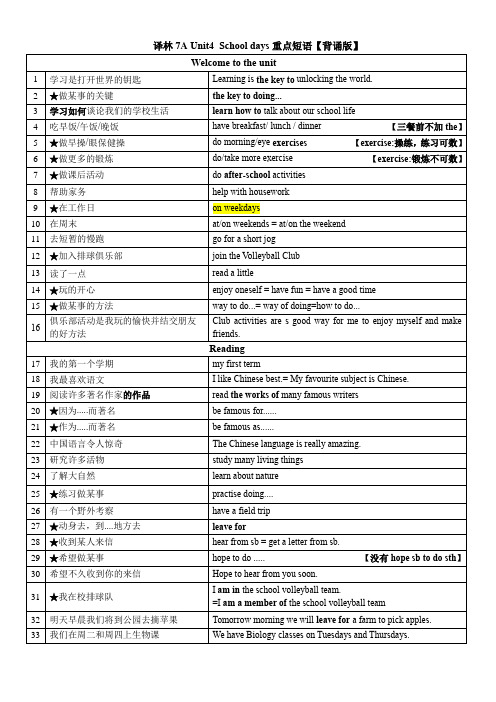
7A Unit4School daysWelcome to the unit1 学习是打开世界的钥匙Learning is the key to unlocking the world.2 ★做某事的关键the key to doing...3 学习如何谈论我们的学校生活learn how to talk about our school life4 吃早饭/午饭/晚饭have breakfast/ lunch / dinner 【三餐前不加the】5 ★做早操/眼保健操do morning/eye exercises 【exercise:操练,练习可数】6 ★做更多的锻炼do/take more exercise 【exercise:锻炼不可数】7 ★做课后活动do after-school activities8 帮助家务help with housework9 ★在工作日on weekdays10 在周末at/on weekends = at/on the weekend11 去短暂的慢跑go for a short jog12 ★加入排球俱乐部join the V olleyball Club13 读了一点read a little14 ★玩的开心enjoy oneself = have fun = have a good time15 ★做某事的方法way to do...= way of doing=how to do...16俱乐部活动是我玩的愉快并结交朋友的好方法Club activities are s good way for me to enjoy myself and makefriends.Reading17 我的第一个学期my first term18 我最喜欢语文I like Chinese best.= My favourite subject is Chinese.19 阅读许多著名作家的作品read the works of many famous writers20 ★因为.....而著名be famous for......21 ★作为.....而著名be famous as......22 中国语言令人惊奇The Chinese language is really amazing.23 研究许多活物study many living things24 了解大自然learn about nature25 ★练习做某事practise doing....26 有一个野外考察have a field trip27 ★动身去,到....地方去leave for28 ★收到某人来信hear from sb = get a letter from sb.29 ★希望做某事hope to do ..... 【没有hope sb to do sth】30 希望不久收到你的来信Hope to hear from you soon.31 ★我在校排球队I am in the school volleyball team.=I am a member of the school volleyball team32 明天早晨我们将到公园去摘苹果Tomorrow morning we will leave for a farm to pick apples.33 我们在周二和周四上生物课We have Biology classes on Tuesdays and Thursdays.34 我想要告诉你关于我的学校生活I would like to tell you about my school life.35 ★说一点中文speak a little Chinese36 ★迫不及待做某事can’t wait to do...37 一切顺利All the bestGrammar ---Further studyFurther study38 ★没有许多时间去打网球don’t have much time to play tennis39 在体育场on the sports field40 ★去溜旱冰go roller skating41 跳舞半小时dance for half an hour42 学习如何种植苹果learn how to grow apples43 长大grow up44 帮助种树help plant trees45 在学校网站上on the school website46 看视频watch a video 【video 复数videos】47 参观田野have a tour of the fields48 带一些苹果回家take some apples home49 我喜欢呆在外面I like being outside.50 ★亲近大自然是好的It’s nice to get close to nature.51 ★享受和平和安静enjoy the peace and quiet52 ★每个人都竭尽全力让事情变得更好Everyone tries their best to make things better.53 竭尽全力,尽某人最大努力做某事try one’s best to do....54 ★有时候野外考察对我来说太累了Sometimes field trips are too tiring for me.55 保持我们学校区域干净感觉很好It feels good to keep our school area clean.56参加take part in = join in57帮助我学习如何照料植物help me learn how to take care of plants58轮流去做不同的值日任务take turns to do different chores59小组合作work in groups60给植物浇水water the plants61清空垃圾桶empty the bins62通过值日,我们每个人都为班级做事并学会团队合作We each do something for our class and learn about teamworkthrough chores.7A Unit4School daysWelcome to the unit1 学习是打开世界的钥匙2 ★做某事的关键3 学习如何谈论我们的学校生活4 吃早饭/午饭/晚饭5 ★做早操/眼保健操6 ★做更多的锻炼7 ★做课后活动8 帮助家务9 ★在工作日10 在周末11 去短暂的慢跑12 ★加入排球俱乐部13 读了一点14 ★玩的开心15 ★做某事的方法16俱乐部活动是我玩的愉快并结交朋友的好方法Reading17 我的第一个学期18 我最喜欢语文19 阅读许多著名作家的作品20 ★因为.....而著名21 ★作为.....而著名22 中国语言令人惊奇23 研究许多活物24 了解大自然25 ★练习做某事26 有一个野外考察27 ★动身去,到....地方去28 ★收到某人来信29 ★希望做某事30 希望不久收到你的来信31 ★我在校排球队32 明天早晨我们将到公园去摘苹果33 我们在周二和周四上生物课34 我想要告诉你关于我的学校生活35 ★说一点中文36 ★迫不及待做某事37 一切顺利Grammar ---Further studyFurther study38 ★没有许多时间去打网球39 在体育场40 ★去溜旱冰41 跳舞半小时42 学习如何种植苹果43 长大44 帮助种树45 在学校网站上46 看视频47 参观田野48 带一些苹果回家49 我喜欢呆在外面50 ★亲近大自然是好的51 ★享受和平和安静52 ★每个人都竭尽全力让事情变得更好53 竭尽全力,尽某人最大努力做某事54 ★有时候野外考察对我来说太累了55 保持我们学校区域干净感觉很好56参加57帮助我学习如何照料植物58轮流去做不同的值日任务59小组合作60给植物浇水61清空垃圾桶62通过值日,我们每个人都为班级做事并学会团队合作。
牛津7A_Unit4_教学要求,知识点讲解和练习

7A Unit 4 Food【单元学习重点和要求】一、语音1. 单词重读`hamburger `hungry `energy `never `exercise `vegetable `dancer`tired `healthy `diet `seldom `often `lifestyle `person`power `water `sour `salty `vinegar `lemon `hotpot`roller `skating `noodle `story `mango `carrot `favoritekilo `pancake `biscuit `total `partner `supermarket `calory `vitamin`peanut im`portant ice `cream pi`ano po`tato to`mato over`allquestion`naire congratu`lation a`mount2. 不完全爆破par(t)ner I wal(k) to my bowl many times a day. Wha(t) food do you like?I wan(t) to be a dancer. I ge(t) tired when I dance. I nee(d) lots of energy to dance.3.句子重音和语调Do we need to buy some ↗vegetables?Are we going to have some ↘fruit?What do we need to ↘buy?How often do you walk to ↘school?二、词汇1. 单词hungry, need, never, exercise, hate, vegetable, dancer, tired, important, healthy, change, before, seldom, fruit, sweet, often, bread, meat, top, fast, juice, person, water, dry, story, ice cream, glass, tea, of course, favorite, kilo, salt, tomato, soup, less than, not…at all, try, feel, luck, supermarket, carry, large, take in, mean, fat, stay, taste.2. 词组take more exercise 多锻炼walk to school 步行上学three time a week 每周三次keep healthy 保持健康join the army 参军the love of one’s country爱国心want to be 想成为……play cards 玩牌play games 做游戏get …from…从……获得(得到)……would like(sb.)to do sth 想要(某人)干某事less than 不到how much/many 多少keep fit 保持健康not at all 根本不;一点也不feel worried 感到忧虑Good luck with sth/to sb 祝好运be busy doing sth 忙于干……;give sb sth.=give sth to sb 给某人某东西三、日常用语We need an egg and a tomato for the soup.我们需要一只鸡蛋和一个西红柿做汤。
牛津译林版英语7A Unit4 My day知识点归纳

牛津译林版英语7A Unit4 My day知识点归纳XXX.你现在开始做作业吧。
(及物动词)I XXX.我昨天开始读一本新书。
(动名词作宾语)I started to learn English when I was six years old.我六岁时开始学英语。
(动词不定式作宾语)语法点拨】一般现在时的用法1.表示经常性的动作或状态。
I usually get up at six o’clock.我通常六点钟起床。
2.表示客观真理。
XXX moves around the sun.地球绕太阳转。
3.表示现在的状态或情况。
I am a student.我是一名学生。
4.表示将来。
XXX.明天早上六点火车开。
5.表示命令、建议、邀请等。
Don’t smoke in the office.办公室里不准吸烟。
Let’s have a walk after supper.晚饭后我们去散步吧。
6.表示评论、描写、说明等。
This book tells us a lot about Chinese history.这本书向我们讲述了很多中国历史。
写作指导】本文主要介绍了一些常用的词汇及语法点,如动词的用法、时态等。
在写作中,要注意正确使用这些词汇和语法点,以使文章表达准确、流畅。
同时,也要注意文章的格式,如段落的分隔等。
We learn English in school。
It's never too late to learn。
Common phrases with "learn" include "learn about" and "learn from." "Learn" emphasizes the act of learning and acquiringknowledge。
while "learn about" emphasizes gaining n and understanding.Just learning about English doesn't mean you've learned the language。
牛津译林版7AUnit4My Day基础考点大梳理

牛津译林版7AUnit4My Day基础考点大梳理一、短语归纳1.wake up醒来2. go out出去3. have breakfast吃早饭4. have lunch吃午饭5. have dinner吃晚饭6. have fun玩得高兴7. get up起床8. go to school去上学9. do morning exercises做早操10. have lessons.上课11. do after-school activities进行课外活动12. watch TV看电视13. go to bed去睡觉14. be late for迟到15. in the morning在上午16. from Monday to Friday从星期一到星期五17. be good at =do well in擅长18. a lot of friends许多朋友19. be nice to sb.=be good to sb.对某人好20. after class课后21. chat with聊天22.in/on the playground在操场上23.go to the library去图书馆24.in the afternoon在下午25. read books读书26. on Tuesday在星期二27. like playing volleyball喜欢打排球28. in the school volleyball team在校排球队29. on Wednesday afternoon在星期三下午30. in the evening在晚上31. each other.互相,彼此32. have a good time have fun enjoy oneself过得愉快,玩得高兴33. best wishes最好的祝福34. go to dancing lesson去上舞蹈课35. go roller skating去溜旱冰36. goon a picnic去野餐37. once a month一月一次38.be good for 对.....好处be bad for 对.....坏处39.too much太多(的) much too (实在)太40. get ready for sth. 为某事准备好二、句法总结1. time(1)It is time for +n. 到....的时间了。
7A Unit 4四会单词、词组、句型

7A Unit 4 四会单词:1.wake vt. Vi. 醒,醒来2.shall modal.v (表示提出或征求意见)3.hill n. 小山4.seldom adv. 很少5.out adv. (从…里)出来,向外,外出6.need vt.需要7.rest n.休息,歇息8.just adv.只是;刚刚9.after-school adj.课外的,课后的10.a ctivity n.活动11.h omework n.家庭作业12.u sually adv.通常,经常13.n ever adv.从不,绝不14.s tart vt. Vi 开始‘着手’15.q uarter n.一刻钟16.p ast prep.晚于17.f irst adv.首先18.e ach det.&pron每人,每个,每件19.o ther pron.另外,其他20.p ractise vi. Vt. 练习;训练21.w ish n.希望,祝愿22.w ould modal v.(表示客气的建议或邀请)23.l ife n. (pl. lives )生活;生命24.w ish vt.希望;祝愿25.l uck n.好运,幸运26.m useum n.博物馆27.r eason n.原因,理由28.r eady adj.准备好,准备完毕29.l earn vt. Vi.学习30.w orld n.世界四会词组;1.wake up醒来2.go out出去3.have breakfast / lunch /supper吃早餐/午饭/晚餐4.have fun玩的开心5.get up起床6.have lessons / classes上课7.do after-school activities 进行课外活动8.do homework做家庭作业9.go to bed上床睡觉10.b e late for 迟到11.i n the morning / afternoon/evening 在上午/下午/晚上12.e ach other 互相13.h ave a good time 玩的高兴14.w ould like 想,愿意15.a ll the best 一切顺利,完事如意16.v isit the museum参观博物馆17.t wice a month一个月两次18.g o on picnics去野餐19.o nce a week一周一次20.g et ready for sth为…准备好四会句型:1.I seldom go out .我很少外出。
- 1、下载文档前请自行甄别文档内容的完整性,平台不提供额外的编辑、内容补充、找答案等附加服务。
- 2、"仅部分预览"的文档,不可在线预览部分如存在完整性等问题,可反馈申请退款(可完整预览的文档不适用该条件!)。
- 3、如文档侵犯您的权益,请联系客服反馈,我们会尽快为您处理(人工客服工作时间:9:00-18:30)。
What day is it today? It’s Tuesday .
What’s the date today? It’s 30 October .
Can you say the names of a week ?
一星期的名称
What are they?
They are Monday
1. Christmas 圣诞节 2. Spring Festival 春节 3. Dragon Boat Festival 龙舟节 4. Mid-autumn Festival 中秋节 5. Halloween 万圣节前夜
时间介词 on: 用在: 某月某日前 1. ______
on 7 October
• Millie’s school starts _____ at eight _______ the morning from Monday to in Friday. at 8:15. • Her lessons begin _____ • Sometimes her friends and she go to the library _____ in the afternoon. on • They often read books there ____ Tuesday and Thursday. • Millie likes playing volleyball. She practises playing volleyball after school ___ on Wednesday afternoon.
Tuesday Thursday
Saturday
Wednesday
Friday
Sunday
Can you say the names of 12 months ? 12个月的名称 What are they?
12 months in a year
January February
April July October
March May June August September November December
in October
There are four
seasons季节 in a year .
4 seasons季节 in a year
in autumn
spring summer
autumn
winter
时间介词
时间介词 at: 用在: 1. 2. 3 4 钟点时间前 ______ 三餐时间前 _______ at at 6:00am supper 8 years old
at 具体年龄前 ________________Christmas
在没有day节日前用 at
Our lessons begin ____ at nine o’clock. Usually we have three in in lessons ____ the morning and two ____ the afternoon. We on Saturday or Sunday. do not have lessons ____ I love sports. I am good at playing football. I often play it on Saturday afternoon. We have a with my friends ____ in football match _____ autumn every year. This year, it is on 15 November. My friends and I always have great _____ fun then.
时间介词 in: 用在: 月份前 1. ______ 2. 3 年份前 _______
in in
October 2012 spring the morning
in 季节前 ________________ in
4 早中晚前 _____
Fill in the blanks with “in”, “on” and “at”. on 1. Christmas Day is _________ 25 December. 2. The new school term begins ________ September. in 3. Uncle Bob visits his relatives _____ on Thanksgiving Day. 4. David and his friends practise football ______ on Sunday. 5. Tommy wants to go to see the film ______ at 6 p.m. this evening. on 6. They often go swimming ______ Friday afternoon. 7. We have a long holiday _______ summer. in in 8. My grandma likes to watch TV ____the afternoon. 9. The little boy can tell stories______ at the age of 3. in 10.I do not think the world will come to an end ____2012.
on Monday 一星期名称前 2. _______ the morning of 3 某月某日的早中晚前 ________________ on May 10 day的节日前 on May Day 4 有 _____
在有day节日前用 on
1. New Year’s Day 2. Children’s Day 3. May Day 4. Mother’s Day 5. Father’s Day 6. Teachers’ Day 7. Thanksgiving Day 元旦节 儿童节 五一节 母亲节 父亲节 教师节 感恩节
Complete the dialogue on Page 47.
Read Part A on P47 and finish Part A1
Dear Millie,
Thanks for your email. I would like to tell you about my life here.
